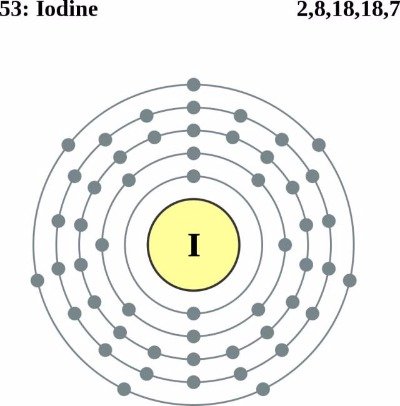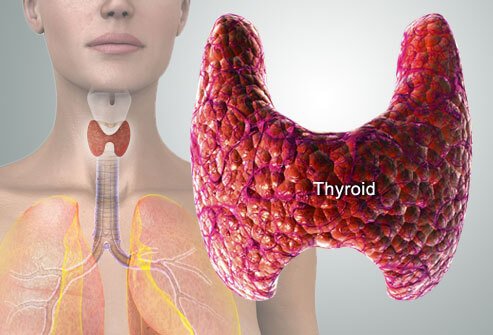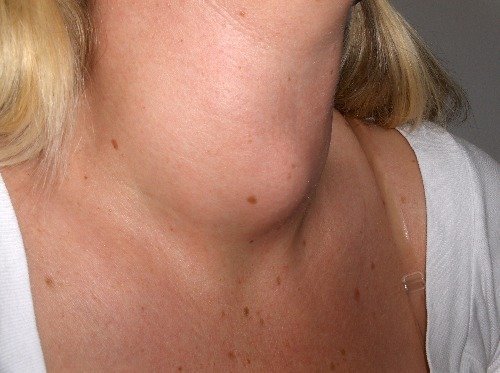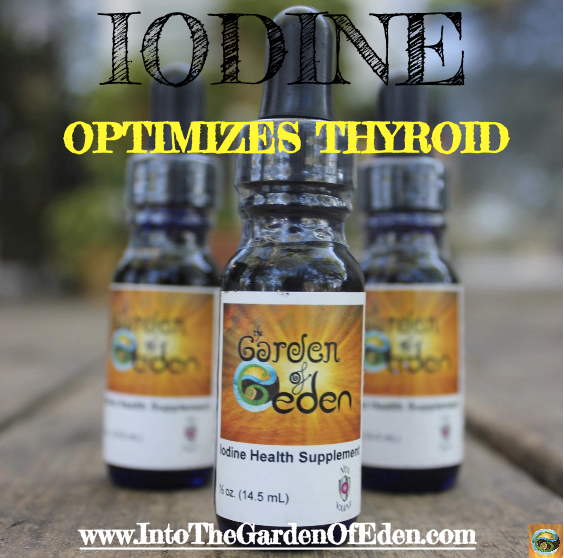Iodine benefits the body in numerous ways. In a previous post, we shared how iodine deficiency makes one susceptible to heavy metal poisoning. Today, we will share how important iodine is for a healthy thyroid.
Iodine is an essential nutrient for the human organism. The body doesn’t make it; you have to consume iodine with your diet and it’s not readily available from the food supply anymore. [1]

Iodine is the 53rd element on the periodic table, with this configuration of electrons in its shells. Image source
The Thyroid
The thyroid gland is shaped like a butterfly and is located at the base of the throat. It is a main player in the the endocrine system. It’s regulated by the pituitary gland, which is regulated by the hypothalamus. Most of the body’s iodine receptors are in the thyroid (women also have a concentration in the feminine tissues, because iodine is necessary for developing babies). [2, 3]

The thyroid produces hormones that regulate metabolism, protein production, and kidney, brain, liver, skin, and heart function. [4] Those are some important systems!
The thyroid creates thyroxine (T4) and triiodothyronine (T3) by absorbing iodine from the blood (which came from the diet) and combining it with the amino acid tyrosine. These thyroid hormones direct metabolism and growth. The thyroid needs 4 atoms of iodine to produce T4 and 3 atoms of iodine to produce T3. [5] If the body doesn’t have enough iodine, the system cannot produce appropriate amounts of these thyroid hormones, which is bad news down the line!
Every cell in the body uses thyroid hormones, therefore every cell in the body depends on appropriate levels of iodine in the body for optimal functioning. [3, 4] Yet 95% of Americans are deficient in iodine! [6] While serious disease may take years to manifest, iodine deficiency guarantees sup-optimal metabolism because iodine is foundational to proper thyroid function.
30 million Americans have thyroid disease--that’s almost 10 % of the population! [2] It affects more women than men, which may not be surprising when we consider that the mother greatly depletes her iodine reserves by incubating and nursing babies. Various thyroid disorders can have the same symptoms. A blood test can confirm a diagnosis.
Hypothyroidism is an underactive thyroid. [2]
In this disorder, the thyroid does not make enough thyroid hormone. It is caused by iodine deficiency. Symptoms can include: [2]
- Increased cholesterol
- Depression
- Fatigue
- Hair loss
- Memory loss
- Dry skin and hair
- Constipation
- Weight gain
- Goiter
Hyperthyroidism is an overactive thyroid. [7]
In this condition, the thyroid makes too much thyroid hormone. Paradoxically it can also be caused by iodine deficiency. [4, 8] Symptoms can include: [9]
- Weight loss
- Anxiety
- Irritability
- Brittle hair
- Sweating
- Rapid heart rate
- Fatigue
- Tremor
- Trouble sleeping
- Frequent bowel movements
- Bulging eyes
- Graves’ disease, an autoimmune disorder that attacks the thyroid
- Goiter
Goiter is an enlargement of the thyroid. [10]

It can be mild to severe.

In the 1920s, doctors observed a prevalence of goiters around the Great Lakes. Iodized salt was introduced as a cost effective and easily distributed means of getting iodine into the food supply. [11] It is not actually iod-ine but manufactured iod-ide that is added to iodized salt, along with a slew of potentially toxic chemicals from anti-caking agents to aluminum derivatives. [12] Further, there is only about 30 mcg of iodine in the recommended daily allowance of iodized salt, and only 10% of the iodine from iodide is actually available for the body. Iodized salt is really not a reliable and healthy source of iodine. [10]
The recommended daily allowance for iodine given by the FDA is actually the bare minimum to prevent goiter rather than to optimize health. The RDA is 150 mcg for men and 220 mcg for pregnant women, and 290 mcg for nursing mothers, but these levels are extremely low given the rampant iodine deficiency in this population. [13, 14]
Untreated thyroid disorders can lead to heart disease, mental problems, infertility, diabetes, and cancer, so it is important to supply the body with enough iodine for optimal thyroid health. [9, 14, 15]
Iodine is a key for metabolism, yet thyroid health is just one of many responsibilities of iodine in the body!
Iodine is an essential nutrient for the body, and it is vital to the foundational functioning of the human organism. Please consider if you are getting enough of this nutrient! There are very few reliable and sufficient sources of iodine in the American food supply, so it is a great idea to contemplate your body’s source. While there are trace amounts of iodine in some seafoods, the only real food on earth with enough to meet the body's needs are sea vegetables. Unless you're eating uncooked, unprocessed sea vegetables on a daily basis or supplementing with a high quality iodine of the proper form, there is really no way your body is getting enough of this foundational element.

Sources:
1. http://advances.nutrition.org/content/4/2/262.full
2. http://www.thyroidawareness.com/about-your-thyroid
3. http://www.endocrineweb.com/conditions/thyroid/how-your-thyroid-works
4. http://jeffreydachmd.com/2014/04/graves-remission-iodine-case-report-jeffrey-dach-md/
5. http://fitsweb.uchc.edu/student/selectives/Luzietti/Thyroid_hormones.htm
7.http://www.mayoclinic.org/diseases-conditions/hyperthyroidism/basics/symptoms/con-20020986
8. http://www.uptodate.com/contents/iodine-in-the-treatment-of-hyperthyroidism
9.http://www.endocrineweb.com/conditions/hyperthyroidism/hyperthyroidism-overview-overactive-thyroid
10.http://www.lifeextension.com/magazine/2011/10/the-silent-epidemic-of-iodine-deficiency/Page-01
11. http://www.ncbi.nlm.nih.gov/pmc/articles/PMC3509517/
12. http://www.globalhealingcenter.com/natural-health/iodine-in-salt/
13.http://www.laurapower.com/page26.html
14. http://journal.diabetes.org/clinicaldiabetes/v18n12000/pg38.htm

